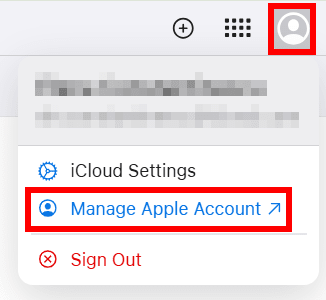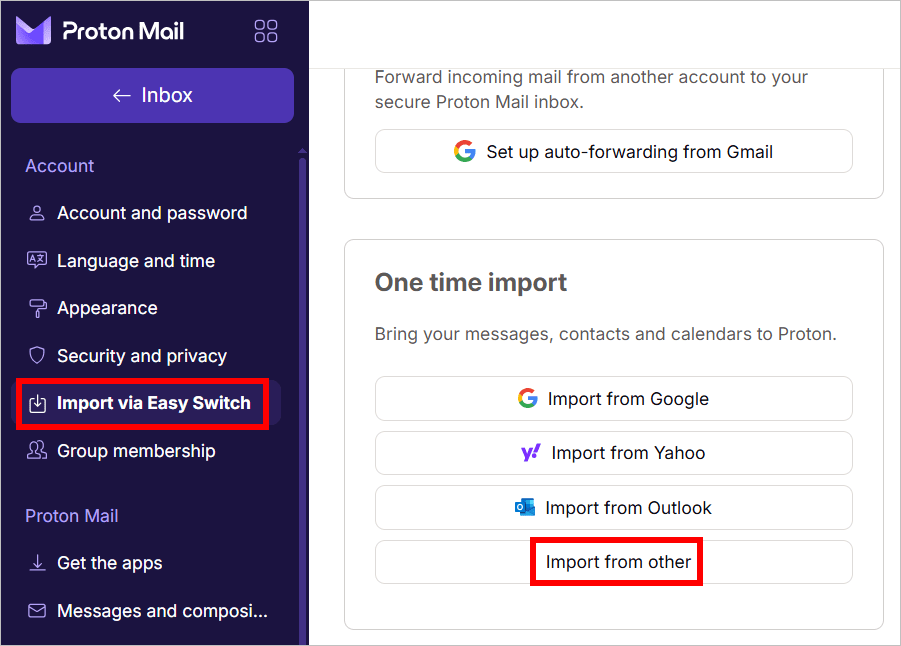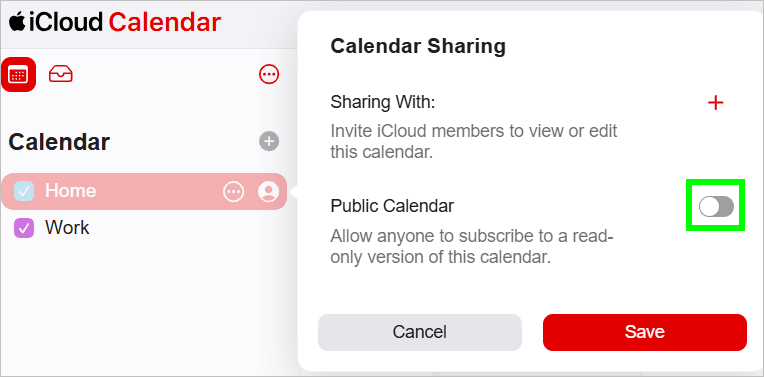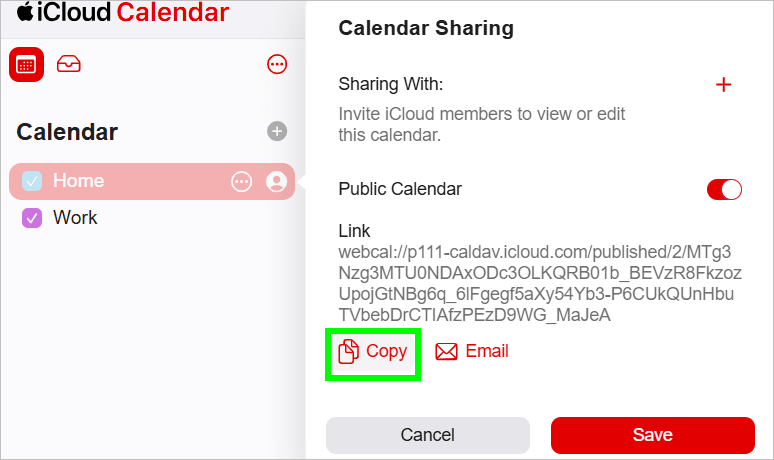How to transfer your emails, contacts, and calendars from Apple/iCloud to Proton
If you want to transition from Apple/iCloud to Proton Mail and Proton Calendar, you’ve come to the right place. This guide will show you how to:
- Transfer your emails
- Transfer your contacts
- Transfer your calendar
- Next steps after moving from iCloud
Transferring your data from iCloud — regardless of whether it’s emails, contacts, or calendars — involves two steps:
- Going to your Apple/iCloud account to authorize a data transfer or to export your data.
- Going to Proton Mail to import your data.
Transfer your emails
Step 1: Get an app-specific password from iCloud Mail
Proton Mail needs permission to access the emails stored in iCloud Mail. You can grant this by generating an app-specific password in iCloud as follows:
- Sign in to iCloud Mail(nové okno) using your Apple Account.
- Click on your profile icon in the top right-hand corner and select Manage Apple Account.

- Select App-Specific Passwords.

- Click Generate an app-specific password, follow the rest of the prompts, and copy the password.

Step 2: Transfer existing emails
- Sign in to your Proton Account.
- Go to Settings ( ⚙️) → All settings.

- Select Import via Easy Switch and then Import from other.

- Select Emails and follow the prompts.

- Enter your iCloud Mail address and
app-specific password. You don’t need to change the
default IMAP and port.

- You can now customize the import if you wish. For example, you can change the label associated with the current set of emails, import to another Proton address, only import emails from the past month or year, and choose which folders to include.

Once you start the import, it will work in the background and you can close the window. You can check the status of your import in the history section of the Easy Switch page.
Transfer your contacts
Proton Mail offers a private, secure space for all your contacts. To create an encrypted contact list from your iCloud contacts, you should export a vCard and import it to Proton Mail. Here’s how:
Step 1: Export your iCloud contacts to a vCard
- Go to iCloud Contacts(nové okno) and log in with your Apple Account.
- Go to All Contacts in the left sidebar and select everyone in your list with Ctrl + A (Windows) or ⌘ + A (Mac).
- Click the share button in the top right and choose Export vCard. This will save a VCF file to your computer.

Step 2: Import the vCard to Proton Mail
- In Proton Mail, open Contacts is the side panel on the right.
- Click Import contacts and select Import from .csv or vCard.
- At the bottom of the panel, click on Import Contacts → Import from .csv or vCard.

- Select the VCF file you exported earlier and click Import.

Alternatively, you can go to Proton Mail settings → All settings → Import from Easy Switch → Import from other, select Contacts, and follow the prompts.
Transfer your calendar
Here’s how you can move your iCloud calendars to Proton Calendar, ensuring your schedule is encrypted and privately stored:
Step 1: Export ICS file from iCloud
- Go to iCloud Calendar(nové okno) and log in with your Apple Account.
- Select a calendar and click the account button.

- Toggle on Public Calendar.

- Copy the generated public calendar URL.

- Enter the copied link into your browser’s search bar. Before hitting Enter (Windows) or Return (Mac), change the beginning of the URL from webcal:// to http://. This will save an ICS file with your calendar.
- Toggle off Public Calendar to prevent anyone from viewing or downloading it.
Step 2: Import ICS file data in Proton Mail
- In Proton Mail, go to Settings (⚙️) → All settings.

- Select Import via Easy Switch → Import from other.

- Choose Calendars.

- Follow the prompts to upload your ICS file. You can also select which calendar you want to transfer these events to. If you want to transfer the events to a new calendar, create the calendar before you start the import.

Next steps after moving from iCloud
With your new Proton Mail account ready to go, here’s how to make things simpler and more secure:
Inform your contacts about your new email address
You can send a short email from Proton Mail to let your contacts know you’re using a new address. Keep in mind that Proton Mail limits the number of recipients per email to prevent spam and phishing, so if you have many contacts, you may need to send your message in multiple batches.
To make it easier to share and remember your new Proton address, you can use your short domain @pm.me email address. For example, if your address is username@proton.me, you also have username@pm.me. Emails sent to @pm.me will arrive in the same inbox as those sent to @proton.me.
All Proton Mail accounts, free and paid, can receive emails at this short address. Paid accounts can also use it to send emails.
Forward your emails
If you don’t want the hassle of checking multiple inboxes, you can forward all new iCloud messages to Proton Mail and ensure you don’t miss any important messages. Here’s how:
- In iCloud Mail, go to Settings.

- Select Forwarding.
- Check the box next to Forward my email to and enter your Proton Mail address. Then check the box next to Delete messages after forwarding.

Plus, you can create a separate folder in Proton Mail to organize messages forwarded from iCloud, making it easy to see which contacts are still using your old address. To remind them to update their records, you can also set up an auto-reply in iCloud(nové okno) that sends whenever someone emails your old account.
Update your email across online services
If you’ve been using your iCloud address for online accounts, you should update them to your new Proton Mail address. Although it can take a while, it’s a good chance to review your security settings and close accounts you no longer use — to prevent leaked information, phishing attacks, and data profiling.
Some examples include:
- Banks and financial services
- Tax platforms
- Cloud and file storage
- Social media
- Online shopping
- Entertainment services
Once iCloud Mail is no longer linked to important services, you can safely delete the account to eliminate a potential entry point for attackers.
If you have email accounts with other providers, check out our guides for moving from Gmail, Outlook, or Yahoo.